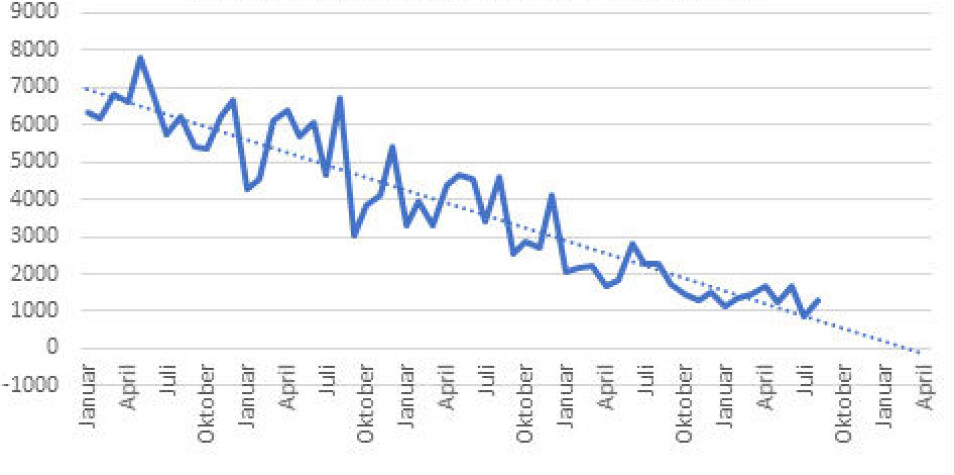A move that would have been hailed as an environmental victory almost anywhere in the world will likely achieve little in Norway — because the country is already doing so well on this front. Norway has set the earliest target in the world for the phaseout of new petrol cars, in 2025. But if trends continue, there’ll be next to no petrol cars by April.

Normally, the announcement would be good news. But there’s even better news. According to an analysis published in the Norwegian Automobile Federation’s magazine, Motor, the decision may not even be needed.
The analysis, which builds on data from Norway’s Road Traffic Information Council (OFV) shows that the demand for gas cars is already decreasing in Norway, and the trendline could reach zero in April 2022.
In the first 8 months of 2017, petrol and diesel cars accounted for 25% of new car sales. Meanwhile, over the same period in 2021, this accounted for 4.93% and 4.73% respectively (for a comparable number of overall sales). If this trend keeps up, there could be virtually no demand for non-electric cars.

The fine print
This is good news no matter how you look at it. But there are a few details that should be worth mentioning. For starters, the statistics count hybrid cars as “electrified” — which is a rather misleading way of looking at it, because hybrid cars just make better use of the energy they derive from fossil fuels, but it’s still fossil fuel energy. However, hybrid cars make up less than 10% of new car sales, so it’s not a major concern.
Furthermore, Norway didn’t technically draft a law to outright ban non-EV cars starting 2025, it’s more a soft commitment than anything else. But maybe this is why this trend is so important.
Already, 14 out of the top 15 best-sold cars in Norway are all EVs — with just one hybrid in the top 15 list. The most popular petrol car is only on 38th place.
The fact that public opinion is shifting towards EVs faster than governments can only be encouraging. We’re witnessing a general trend in many parts of the world, with more and more people embracing electric cars. But there’s another side to this story: money.
While the upfront cost of an EV may be higher, the long-term maintenance costs are already significantly lower. But what really made a difference in Norway is tax incentives. Gas vehicles are subjected to a hefty tax, while EVs are exempt.
To make the switch from cars that run on electricity, we probably need a bit of all of the above: a cultural shift in perspective favoring electric cars, financial incentives, and in time, bans. For now, Norway is leading the pack. Hopefully, others will catch up.









